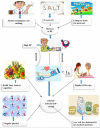Comprehensive effects of lifestyle reform, adherence, and related factors on hypertension control: A review
- PMID: 37161520
- PMCID: PMC10246465
- DOI: 10.1111/jch.14653
Comprehensive effects of lifestyle reform, adherence, and related factors on hypertension control: A review
Abstract
Despite the effectiveness of currently available antihypertensive medications, there is still a need for new treatment strategies that are more effective in certain groups of hypertensive and for additional resources to combat hypertension. However, medication non-adherence was previously recognized as a major problem in the treatment of hypertension. The mechanisms behind the positive impacts of lifestyle changes might occur in different ways. In comparison with other studies, the efficacy and effectiveness of lifestyle modifications and antihypertensive pharmaceutical treatment for the prevention and control of hypertension and concomitant cardiovascular disease have been demonstrated in randomized controlled trials. However, in this review, the attitudinal lifestyle modifications and barriers to blood pressure control were elaborated on. An effective method for reducing blood pressure (BP) and preventing cardiovascular events with antihypertensive medications has been outlined. Maintaining healthy lifestyle factors (body mass index, diet, smoking, alcohol consumption, sodium excretion, and sedentary behavior) could lower systolic blood pressure BP by 3.5 mm Hg and reduce the risk of cardiovascular disease (CVD) by about 30%, regardless of genetic susceptibility to hypertension. Conducting a lifestyle intervention using health education could improve lifestyle factors, such as reducing salt, sodium, and fat intake, changing eating habits to include more fruits and vegetables, not smoking, consuming less alcohol, exercising regularly, maintaining healthy body weight, and minimizing stressful conditions. Each behavior could affect BP by modulating visceral fat accumulation, insulin resistance, the renin-angiotensin-aldosterone system, vascular endothelial function, oxidative stress, inflammation, and autonomic function. Evidence of the joint effect of antihypertensive medications and lifestyle reforms suggests a pathway to reduce hypertension.
Keywords: blood pressure; cardiovascular disorders; diets control; public health.
© 2023 The Authors. The Journal of Clinical Hypertension published by Wiley Periodicals LLC.
Conflict of interest statement
The authors declare no conflicts of interest
Figures




Similar articles
-
The future of antihypertensive treatment.Am J Ther. 2007 Mar-Apr;14(2):121-34. doi: 10.1097/01.pap.0000249915.12185.58. Am J Ther. 2007. PMID: 17414579 Review.
-
Lifestyle modifications to prevent and control hypertension. 1. Methods and an overview of the Canadian recommendations. Canadian Hypertension Society, Canadian Coalition for High Blood Pressure Prevention and Control, Laboratory Centre for Disease Control at Health Canada, Heart and Stroke Foundation of Canada.CMAJ. 1999 May 4;160(9 Suppl):S1-6. CMAJ. 1999. PMID: 10333847 Free PMC article.
-
The 2010 Canadian Hypertension Education Program recommendations for the management of hypertension: part 2 - therapy.Can J Cardiol. 2010 May;26(5):249-58. doi: 10.1016/s0828-282x(10)70379-2. Can J Cardiol. 2010. PMID: 20485689 Free PMC article. Review.
-
Lifestyle modifications to prevent and control hypertension. 5. Recommendations on dietary salt. Canadian Hypertension Society, Canadian Coalition for High Blood Pressure Prevention and Control, Laboratory Centre for Disease Control at Health Canada, Heart and Stroke Foundation of Canada.CMAJ. 1999 May 4;160(9 Suppl):S29-34. CMAJ. 1999. PMID: 10333851 Free PMC article.
-
Association of lifestyle modification and pharmacological adherence on blood pressure control among patients with hypertension at Kenyatta National Hospital, Kenya: a cross-sectional study.BMJ Open. 2019 Jan 17;9(1):e023995. doi: 10.1136/bmjopen-2018-023995. BMJ Open. 2019. PMID: 30782721 Free PMC article.
Cited by
-
Descriptive epidemiology of prevalence of exercise habits among participants with hypertension: The National Health and Nutrition Survey 2013-2018.J Gen Fam Med. 2024 Mar 1;25(3):128-139. doi: 10.1002/jgf2.683. eCollection 2024 May. J Gen Fam Med. 2024. PMID: 38707701 Free PMC article.
-
Antihypertensive Effect of Perla and Esmeralda Barley (Hordeum vulgare L.) Sprouts in an Induction Model with L-NAME In Vivo.Metabolites. 2024 Dec 3;14(12):678. doi: 10.3390/metabo14120678. Metabolites. 2024. PMID: 39728459 Free PMC article.
-
The role of healthy lifestyle categories and score trend in managing hypertension among hypertensive adults.Sci Rep. 2025 Aug 25;15(1):31194. doi: 10.1038/s41598-025-16024-2. Sci Rep. 2025. PMID: 40854959 Free PMC article.
-
Hypertension guideline implementation and blood pressure control in Matlosana, South Africa.S Afr Fam Pract (2004). 2024 Oct 30;66(1):e1-e10. doi: 10.4102/safp.v66i1.5964. S Afr Fam Pract (2004). 2024. PMID: 39494661 Free PMC article.
-
The effects of a digital lifestyle intervention in patients with hypertension: Results of a pilot randomized controlled trial.J Clin Hypertens (Greenwich). 2024 Aug;26(8):902-911. doi: 10.1111/jch.14811. Epub 2024 Jul 11. J Clin Hypertens (Greenwich). 2024. PMID: 38992970 Free PMC article. Clinical Trial.
References
-
- Flynn JT, Kaelber DC, Baker‐Smith CM, et al. Clinical practice guideline for screening and management of high blood pressure in children and adolescents. Pediatrics. 2017; 140(3):e20171904. - PubMed
-
- Macedo ME, Lima MJ, Silva AO, Alcantara P, et al. Prevalence, awareness, treatment and control of hypertension in Portugal: the PAP study. J Hypertens. 2005;23(9):1661‐1666 - PubMed
-
- Feng YJ, Wang HC, Li YC, Zhao WH. Hypertension screening and follow‐up management by primary health care system among Chinese population aged 35 years and above. Biomed Environ Sci. 2015;28(5):330‐340. - PubMed
Publication types
MeSH terms
Substances
LinkOut - more resources
Full Text Sources
Medical

